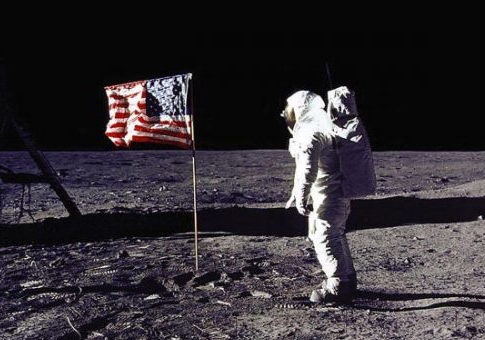The Cold War may be over, but the New York Times' devotion to ignoring the crimes of the Soviet regime endures. As we celebrate the 50th anniversary of the Apollo 11 moon landing, the Times felt the need to lecture its readers that the U.S. actually lost the space race... the "Space Race for Equality" that is.
The Cold War was fought as much on an ideological front as a military one, and the Soviet Union often emphasized the sexism and racism of its capitalist opponents — particularly the segregated United States. And the space race was a prime opportunity to signal the U.S.S.R.’s commitment to equality. After putting the first man in space in 1961, the Soviets went on to send the first woman, the first Asian man, and the first black man into orbit — all years before the Americans would follow suit.
It's worth noting off the bat that the Soviets placed a black man in space first solely because of an unfortunate accident of history. In 1967 Robert Henry Lawrence Jr. became the first black astronaut, part of a conscious effort by the United States to place a black man in space. Tragically, he was killed in a training accident months later.
But more importantly, there's no acknowledgement on the Times's part that these diverse cosmonauts were propaganda efforts on behalf of totalitarian regimes, and in service to an expansionist ideology that sought to place the entire world under similar totalitarianism regimes. The first Asian man in space was Vietnamese, to increase sympathy for a regime that oppressed the Vietnamese. The first black man in space was Afro-Cuban, to increase sympathy for a regime that oppressed Cubans. These were not victories for people of color, they empowered those who kept them in bondage.
"Cosmonaut diversity was key for the Soviet message to the rest of the globe: Under socialism, a person of even the humblest origins could make it all the way up," reads the stinger of the piece. The author makes no effort to point out that was an abominable lie; those of humble origin stayed in humble origins under those regimes, and that's not including those the authorities chose to murder for real or imagined crimes against socialism.
This piece fits right in with the trend of the Times praising communism and aspects of its totalitarian regimes that abide modern woke sensibilities. Among them:
- Women had better sex under communism
- Stalinism inspired Americans, and communism "prodded the country into becoming the democracy it always said it was"
- The Bolsheviks were really romantics deep down, with beautiful love lives
- Lenin was an environmentalist, who loved hiking
- Without the Soviets, we would not have "Star Trek"
- The Soviets supported the Harlem Renaissance
That last piece highlights exactly the sort of Soviet hypocrisy that the Times is praising here. Langston Hughes's movie project fell though, with his Soviet partners "betraying the African-American cause to curry favor with Washington... hoping to receive official recognition." Claude McKay had a falling out with communism when the supposedly anti-colonialism Soviets did nothing when their then-ally Italy invaded Ethiopia. The Soviets were loud and fervent supporters of civil rights and racial minorities, riiiight up until the point it no longer furthered their interests.
Most intelligent observers in the Western world saw their propaganda for what is was; Twitter's favorite talking point, "whataboutism", was originally coined to refer to the Soviet practice of pointing to the ills of the Western world to distract from its own horrendous civil rights record. A few useful idiots fell for the shtick. It's remarkable that decades later, the Times still counts itself among the latter.
